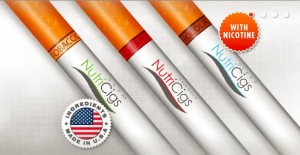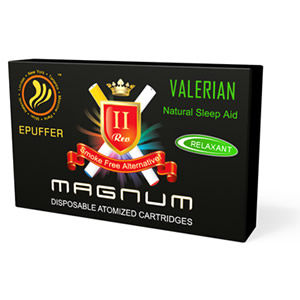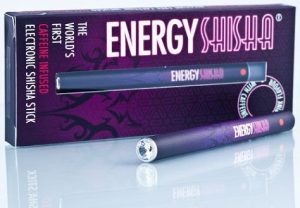Are E-Cigarettes Becoming More Than Just an Alternative to Smoking?
Electronic cigarettes are currently being advertised as an effective alternative to smoking, and are used mainly by smokers who want kick tobacco for good or at least cut down on cigarettes. But is that all e-cigs can be used for? Some brands seem to think they have a lot more potential, and they’ve introduced a new kind of fortified electronic cigarettes laced with dietary supplements meant to help users lose weight, sleep better or get an energy boost.
 When Hon Lik invented the electronic cigarette, over a decade ago, I bet he never thought it would be used as anything more than an alternative to the analog or as a quit-smoking aid, at best. but human innovation is something that can rarely be foretold, and e-cig makers are already cooking up a plethora of new features for their products, from tech-related improvements like online monitoring of puffing habits or biometric locks, to special e-liquids laced with popular dietary supplements. While the mentioned high-tech characteristics are still being tested before they hit the market, supplement-charged e-cigs are already available.
When Hon Lik invented the electronic cigarette, over a decade ago, I bet he never thought it would be used as anything more than an alternative to the analog or as a quit-smoking aid, at best. but human innovation is something that can rarely be foretold, and e-cig makers are already cooking up a plethora of new features for their products, from tech-related improvements like online monitoring of puffing habits or biometric locks, to special e-liquids laced with popular dietary supplements. While the mentioned high-tech characteristics are still being tested before they hit the market, supplement-charged e-cigs are already available.
Granted, the number of companies offering this new type of e-cigs and e-liquids is still very low, let’s not forget that the whole vaping phenomenon had a very timid start before turning into the successful global industry it is today.
Although not an electronic cigarette per se, Vaportrim, one of the first inhalers designed to help users lose weight, was inspired by e-cigarette technology. It didin’t produce any vapor, but it looked just like a disposable e-cig and relied on zero-calories sweet flavors like cupcake or blueberry muffins to curb cravings. It was launched in 2012 and got a lot of media attention, but died shortly after. However, it signaled the beginning of a new trend.
Dietary supplements are all the rage these days, although the effectiveness of many of them has yet to be confirmed, and  a number of entrepreneurs decided they would make a great pair with the also popular electronic cigarette. A quick Google search reveals there are several brands out there selling supplement-infused e-cigarettes and e-liquid.
a number of entrepreneurs decided they would make a great pair with the also popular electronic cigarette. A quick Google search reveals there are several brands out there selling supplement-infused e-cigarettes and e-liquid.
NutriCigs is one such brand. They offer three kinds of disposable “fortified e-cigarettes” that supposedly help users lose weight, get a better night’s sleep or get an energy boost. The NutriCigs Slim contains “all-natural ingredients” like Hoodia and Peppermint, the NutriCigs Sleep is infused with Tryptophan, Melatonin, Tyrosine, and GABA (gamma-Aminobutyric acid), apparently “all things the human body produces itself”, while the NutriCigs Energy relies on essential B Vitamins such as Vitamins B2, B3, B6, and B12, as well as Caffeine, Tourine and Glucuronolactone to give tired vapers an energy kick. All three varieties also contain nicotine, which is a bit strange, considering nicotine is a known stimulant which consumed close to bedtime may make it difficult for a person to fall asleep.
Epuffer, the popular online e-cigarette store, sells cartridges laced with Valerian, a natural relaxant and sleeping aid. The root of his perennial plant contains isovaleric and valerenic acids, which are thought “to relax the central nervous system and promote a good night’s sleep”. A maximum of 30-40 puffs off one of these special cartridges are believed to help vapers get a better night’s sleep.
Advertised as the world’s first electronic shisha, Energy Shisha is said to work just like energy drinks, the only difference being you inhale vapor to get the same effect. Apart from the usual ingredients (propylene glycol, vegetable glycerin and flavorings), this e-cigarette contains caffeine (0.3% per ml.) and Taurine. It’s sugar and nicotine free.
 These are just some of the brands I found while searching electronic cigarettes infused with dietary supplements, but I’m pretty sure there are others. The big question however is, do they actually work? Well, their description on the brands’ websites certainly say they do, but a short thread I found on the hugely-popular E-Cigarette Forum, shows users are still very skeptical. Many of them believe this new trend is just a marketing gimmick designed to squeeze more money out of vapers, and explain that caffeine and vitamins are not metabolized via inhalation, and that caffeine molecules are either destroyed or damaged at the temperatures e-cigarette vapor is usually produced.
These are just some of the brands I found while searching electronic cigarettes infused with dietary supplements, but I’m pretty sure there are others. The big question however is, do they actually work? Well, their description on the brands’ websites certainly say they do, but a short thread I found on the hugely-popular E-Cigarette Forum, shows users are still very skeptical. Many of them believe this new trend is just a marketing gimmick designed to squeeze more money out of vapers, and explain that caffeine and vitamins are not metabolized via inhalation, and that caffeine molecules are either destroyed or damaged at the temperatures e-cigarette vapor is usually produced.
It’s still early to tell if these supplement-infused e-cigarettes will become to regular electronic cigarettes what energy drinks are to sodas today, but it’s clear that some brands are trying to take full advantage of e-cigs’ potential and expand into new territory. Will their efforts pay off? Only time will tell, I guess.
















